STATEHOUSE REPORT | ISSUE 20.13 | MARCH 26, 2021
BIG STORY: Medical marijuana bill may face too many hurdles
NEWS BRIEFS: State administers more than 2 million vaccine doses
LOWCOUNTRY, Ariail: Getting back to normal
COMMENTARY, Brack: Get the vaccine to promote the common good
SPOTLIGHT: S.C. Hospital Association
FEEDBACK: Great cartoon and left lane slowpokes
MYSTERY PHOTO: Epic fail
Medical marijuana bill may face too many hurdles
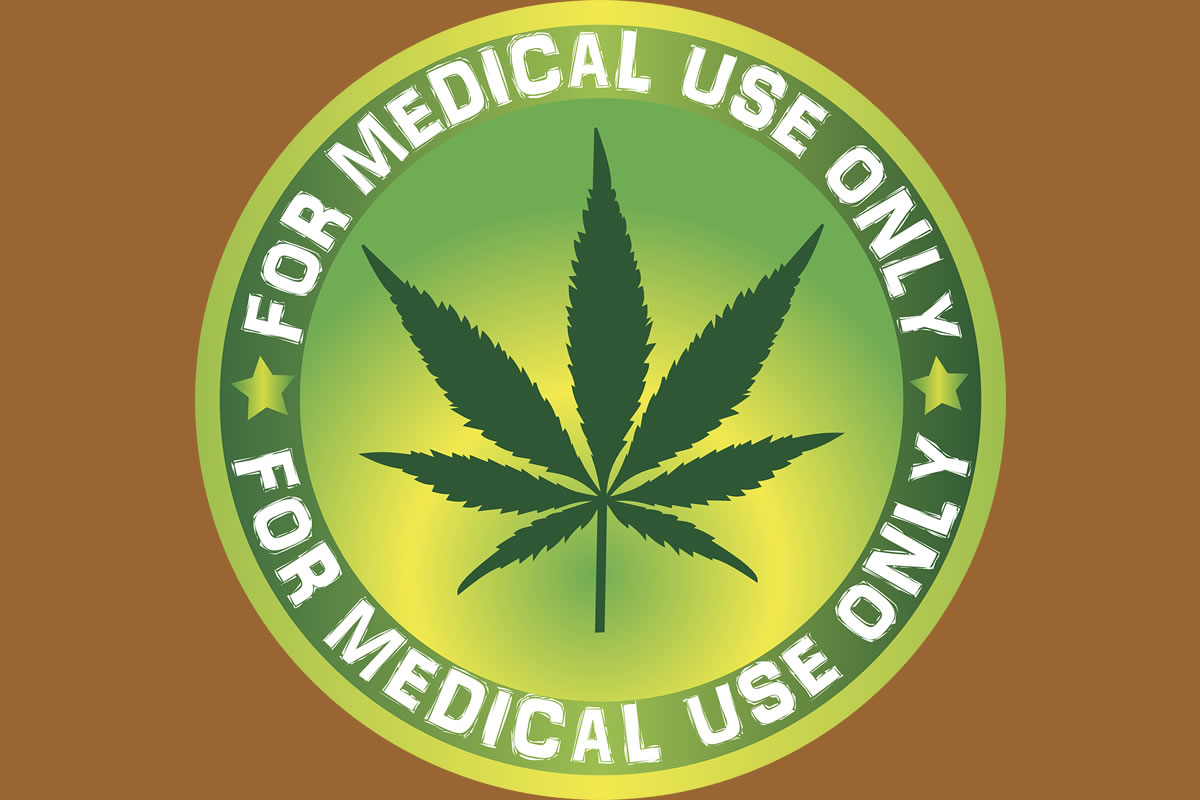
A news analysis by Andy Brack | There are a lot of great therapeutic reasons for South Carolina’s medical marijuana bill to pass this year, but the likelihood of it happening is dwindling.
 The bill often is described by lead sponsor and GOP Sen. Tom Davis, R-Beaufort, as the most conservative proposal to allow for the medical use of marijuana in the country. It would permit doctors to prescribe oral or topical forms of marijuana for therapeutic medical use to alleviate suffering for chronic pain, cancer, glaucoma, epilepsy and other debilitating conditions. The legislation specifically would not allow medical marijuana via smoking.
The bill often is described by lead sponsor and GOP Sen. Tom Davis, R-Beaufort, as the most conservative proposal to allow for the medical use of marijuana in the country. It would permit doctors to prescribe oral or topical forms of marijuana for therapeutic medical use to alleviate suffering for chronic pain, cancer, glaucoma, epilepsy and other debilitating conditions. The legislation specifically would not allow medical marijuana via smoking.

Thirty-eight states, including Mississippi at the polls in November, have approved some form of medical marijuana. Four in five South Carolina Democrats said they were for medical marijuana in a non-binding question on the 2018 primary ballot.
While the proposal has been debated for several years in South Carolina, the measure got a boost this week when a Senate committee voted 9-5 to send Davis’s bill to the floor. But it’s likely to fail again, many say. Among the reasons:
Time. If the bill doesn’t pass the Senate by next Thursday, rules require a supermajority for it to be sent on to the S.C. House for consideration. The Senate calendar, already packed with other legislation, is working against the bill.

“Who knows? Maybe no one will tie us up if we can get it over to the House by the (Thursday) deadline,” said a co-sponsor, Sen. Marlon Kimpson, D-Charleston. “But I suspect even if we do, there will be turbulence.”
House. Even if it makes it to the House, the calendar is working against the bill. The legislative session is slated to end next month.
“There is very little time left in the legislative session to review the bill in committee and debate it in the House,” said another supporter, S.C. Rep. Wendy Brawley, D-Hopkins.
Opposition. While polling shows big majorities in favor of medical marijuana, opposition from doctors and law enforcement officers is strong. That makes lawmakers from both parties take a significant pause.
“My head tells me to vote against this,” Senate President Harvey Peeler, R-Gaffney, said, according to the Associated Press.

Charleston Police Chief Luther Reynolds said he is concerned about a variety of community impacts if medical marijuana were to be approved. And if it is, there would need to be significant work on how it is made available so it isn’t abused.
“Medical marijuana is deceptive in how it is being presented across the country and locally,” he told Statehouse Report. “I believe at some point marijuana will be legalized but what we have learned around the country is there is no plan for the implementation process.
“There is a significant amount of money and power behind the hard push for legalization and ‘medicinal use’ is the means being used to bring this issue across the finish line. We know from other states it has little to do with medical applications and is all about expanding legalization.”
Pure politics. The state Senate generally is the more moderate of the state’s two legislative chambers. In the House, the bill would face partisan opposition from right-wing forces, state Democratic Party Chairman Trav Robertson said.
“I don’t know how this bill gets out when it appears the far-far right wing of the Republican Party is controlling the legislative session,” Robertson said. “You’ve seen it with the open carry (gun) bill. You’ve seen it with the fetal heartbeat (abortion) bill.”
A path to passage
Meanwhile Gov. Henry McMaster, a former attorney general who has opposed the proposal, has hinted there may be a way to pass medical marijuana, particularly because Davis makes a convincing argument that medical marijuana alleviates a tremendous amount of suffering.
“I’m open to hearing more about it because it’s clear that it alleviates a lot of suffering,” McMaster said last month. “The trick is how to keep that from turning loose marijuana production in the state that would cause damage.”

Robertson said he became a convert to the treatment a few years ago during a spring lunch in a Columbia restaurant.
“If you’ve ever been sitting at a table in a restaurant and see parents bring out cannabis oil when a child is having an epileptic attack, it changes your entire position on this issue,” he said. “I was not a believer until that occurred. I saw the medication work immediately” and calm the child.
Senate Minority Leader Brad Hutto, D-Orangeburg, said he remained hopeful the bill would pass this year. But he added, “Law enforcement and the South Carolina Medical Association continue to oppose the bill making the task to pass a bill more daunting.
“But for the many South Carolinians who are suffering and whose symptoms would be treated by the prescription of medical marijuana, this is a fight worth continuing even in the face of headwinds against us.”
Andy Brack is editor and publisher of Statehouse Report. Have a comment? Send to: feedback@statehousereport.com.
State administers more than 2 million vaccine doses
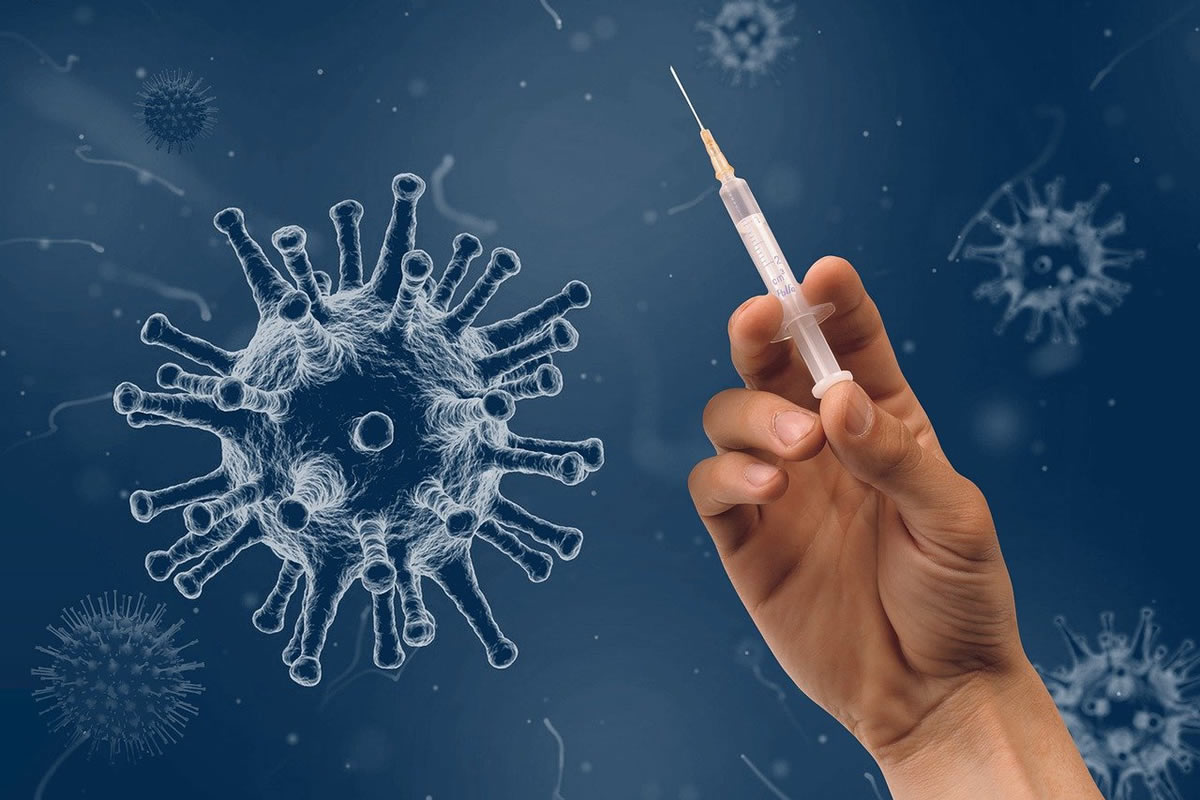
Staff reports | South Carolina has administered 2,034,077 doses of available COVID-19 vaccines, according to a Thursday press release by the S.C. Department of Health and Environmental Control. This announcement comes just one day after general vaccine eligibility opened up to all S.C. residents ages 16 and older.
Though more residents are getting vaccinated, health officials warned people to continue taking precautions as other areas of the state, including Greenville and Anderson, are seeing a spike in case numbers.
New supplies of the Johnson & Johnson vaccine may be temporarily low in the coming weeks as states are expecting delays in future shipments of the single-dose vaccine after a Baltimore-based manufacturing company mistakenly ruined 15 million doses on Wednesday.
DHEC announced 510 new cases out of 12,657 tests Thursday, a percent positive of 5.7%. An additional 14 confirmed deaths and 14 probable deaths were reported.
In other recent news:
![]() “White Lives Matter” rallies being organized. White supremacist rallies are being organized in the Carolinas and nationwide later this month under the banner of “White Lives Matter.” Members of the Proud Boys have been among those participating in organizing the rallies nationwide, scheduled for April 11. Rhetoric used by national organizers invokes debunked theories of racial violence pushed by white supremacist killers in Charleston and elsewhere. Channels organizing events in Columbia, Asheville, Greensboro and statewide in South Carolina have been created using the anonymous Telegram messaging app as of Wednesday. Read more of this Raw Story report.
“White Lives Matter” rallies being organized. White supremacist rallies are being organized in the Carolinas and nationwide later this month under the banner of “White Lives Matter.” Members of the Proud Boys have been among those participating in organizing the rallies nationwide, scheduled for April 11. Rhetoric used by national organizers invokes debunked theories of racial violence pushed by white supremacist killers in Charleston and elsewhere. Channels organizing events in Columbia, Asheville, Greensboro and statewide in South Carolina have been created using the anonymous Telegram messaging app as of Wednesday. Read more of this Raw Story report.
Senators look to reform election agency in S.C. South Carolina senators approved a bill Wednesday that would end the terms of the five members of the State Election Commission, force the state’s elections director to resign and allow the Senate to approve who takes over those roles. The bill will be sent to the House next week, but a gubernatorial spokesman called the bill a power grab for political interference in elections. More: AP News.
S.C. lawmakers consider breaking up public health agency. South Carolina lawmakers will hold hearings this spring on a bill to split up the state’s sprawling public health and environmental agency. More: AP News.
Trump looms over race for S.C. GOP chairman. In South Carolina — where former President Donald Trump’s 2016 primary victory marked a turning point in solidifying his nomination — the contest to lead the state’s Republican Party is turning into a debate over whose support for the former president is highest. More: AP News.
S.C. Dems want Medicaid expansion; GOP says no. Democratic state senators said a new offer from Congress ought to be enough to get South Carolina to join 38 other states and expand Medicaid to about 200,000 more uninsured residents. More: AP News.
S.C. Senate passes bill requiring full-time school. The state Senate this week unanimously passed a proposal requiring all public schools to provide in-person classes five days a week starting as soon as April 12. The proposal now heads to the House. Fifty-four of South Carolina’s 79 traditional school districts are back to five days of in-person classes. All but six districts plan to offer them by the April 12 deadline in the proposal, state officials say. More: AP News.
$6M in COVID-19 funding going to free computer labs, McMaster says. S.C. Gov. Henry McMaster said Tuesday he will spend $6 million in discretionary COVID-19 relief funds on free community computer labs near broadband deserts statewide. More: AP News.
ACLU demands McMaster stop requiring public employees to return to work. The American Civil Liberties Union of South Carolina is demanding that Gov. Henry McMaster rescind his order for state employees to return to their office, but he has declined. More: The Post and Courier.
S.C.’s Graham, Scott introduce broadband bill. U.S. Sens. Lindsey Graham and Tim Scott have teamed up with U.S. Rep. Jim Clyburn — all of South Carolina — to push for expanded internet access with a new bill. More: Florence Morning News.
Former S.C. gov, congressman joins lobbying firm. Mark Sanford has landed a gig with lobbyists Shumaker Advisors. The former South Carolina governor, congressman and presidential candidate has been tapped as an executive vice president and principal. The lobbying group operates in the Carolinas, Ohio, Florida, and Michigan. More: AP News.
Getting back to normal
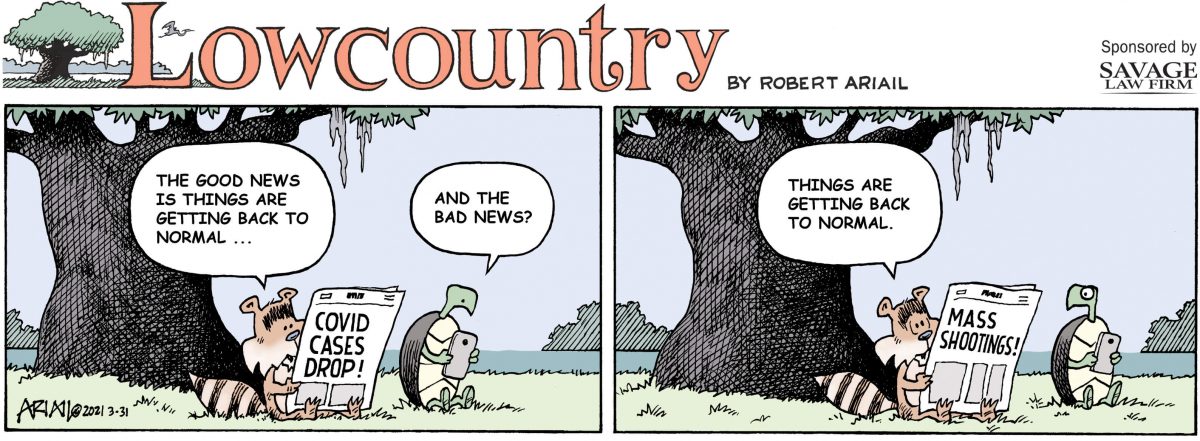
Here’s a new cartoon by Robert Ariail that first was published in our sister newspaper, the Charleston City Paper. Love it? Hate it? What do you think: feedback@statehousereport.com.
Get the vaccine to promote the common good
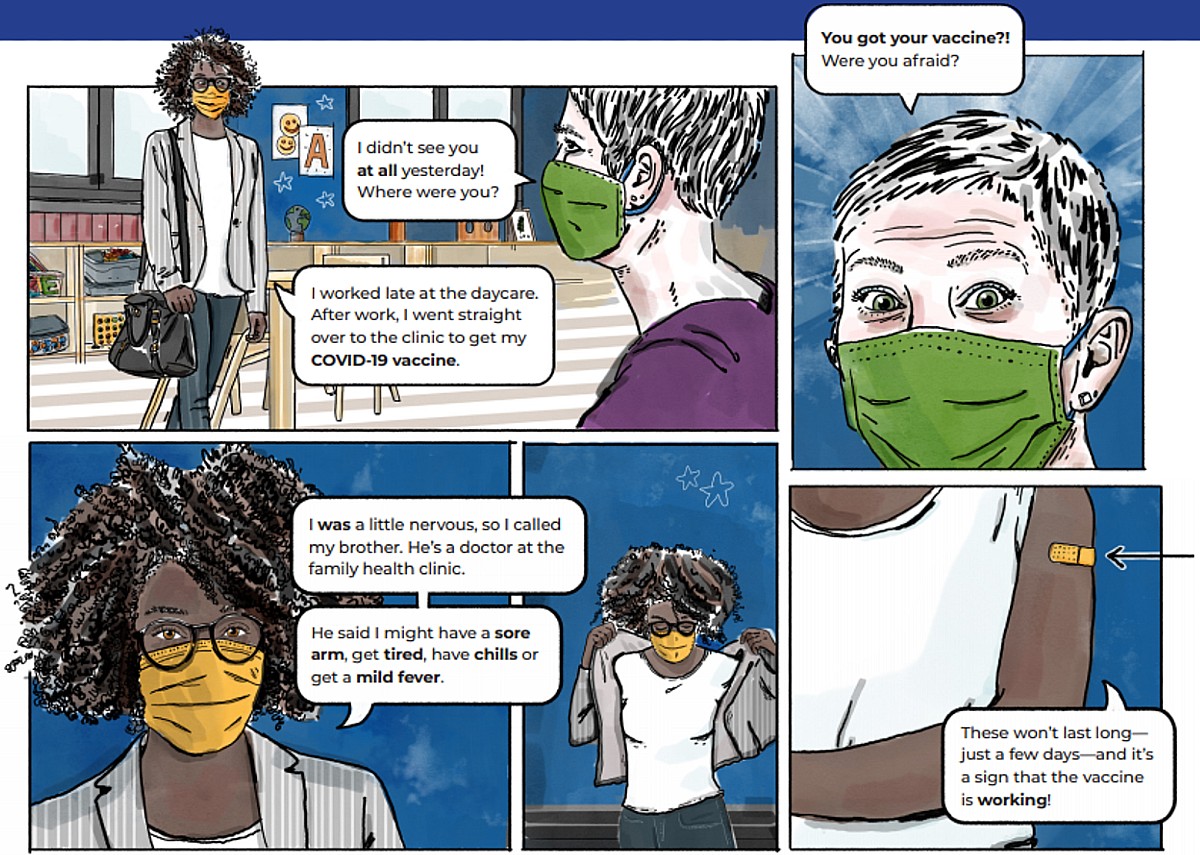
By Andy Brack, editor and publisher | Getting immunized with a COVID-19 vaccine is a huge act of kindness to your community.
 While being vaccinated will give one a high level of personal protection against the highly infectious disease, it also helps to dampen its spread around the state.
While being vaccinated will give one a high level of personal protection against the highly infectious disease, it also helps to dampen its spread around the state.
Unfortunately, not everyone has absorbed why vaccinations are vital. For one reason or another, they don’t want to get the shots or are hesitant about them. But polling shows the number of ambivalent people is dropping. A survey of almost 80,000 Americans by the U.S. Census last month showed 17 percent said they would definitely or probably not get vaccinated. That’s down from 22 percent in January, according to a story in The Wall Street Journal.
A small subset are people who are ideologically against vaccines — anti-vaxxers — who don’t believe in them for reasons often based on misinformation or wild conspiracy theories. Despite reams of medical evidence that vaccines are safe and effective, there’s not much that can be done to persuade these folks to get their shots.
But most people unsure about vaccines are just wary, despite lots of science-based evidence. Some are waiting to see what happens. Others are worried about side effects. Others are concerned that various vaccines were developed too quickly. That’s why it’s vital for people to talk with health professionals and learn about the national effort to quell the spread of the virus through a robust vaccination program.

Dr. Marvella E. Ford, director of the Office of Community Outreach and Engagement at the Hollings Cancer Center in Charleston, meets frequently with people in communities of color to reassure them that coronavirus vaccines are safe because they’ve been through lots of trials with thousands of volunteers with multiple levels of oversight.
“Nobody wants to make people sick,” she said. “Why would public health organizations in the United States want to administer vaccines if they were not good for people?
“Getting the vaccine isn’t about you — it’s about your children, your families, your neighbors, the people you go to church with. The question is how important are those people to you.”
People of color often have lower vaccination rates because of how they’ve been used in medical studies. Dr. J. Marion Sims, a South Carolina native, is known as the father of modern gynecology, but he remains controversial because of his 19th century surgical techniques that included operating on unanesthetized enslaved Black women. Starting in 1932, hundreds of Black men in Alabama died from untreated syphilis in a 40-year study.
But medicine operates differently now, in part because of the lessons learned in studies now considered unethical. Ford recalled a 1997 bioethics symposium at the Tuskegee Institute, the very place where the syphilis study occurred. She remembered a talk by a civil rights lawyer representing the surviving patients who said they wanted people of color to understand how their experiences led to safeguards now required in medical trial studies.
Past sacrifices led to new practices. Medical trial studies like those with the new vaccine now require informed consent, data monitors, safety monitors, institutional review boards and more. In other words, there is significant oversight to make sure things are done right, Ford said.

Dr. Michael D. Sweat, who is director of MUSC’s Division of Global and Community Health, said resistance to new ways of doing things or new technologies often fades over time. For example, people used to smoke in public places and drive cars without seatbelts. Public policies changed those behaviors.
“Over the years, they’ve gotten used to it and don’t think twice about it,” he said. It’s the same with the flu shot. And it likely will be the same with the COVID-19 vaccine.
Ford and Sweat also agreed it’s a misconception that the new vaccines have been rushed. Rather, all sorts of manpower and money were targeted globally with an urgency for teams to apply lessons learned over years of study of coronaviruses and vaccinations.
An estimated 45 percent of South Carolinians currently have immunity from COVID-19 due to natural immunity after having the disease or from vaccinations. Let’s all get vaccinated soon to stamp out this community threat.
Andy Brack is editor and publisher of Statehouse Report and publisher of the Charleston City Paper. Have a comment? Send to: feedback@statehousereport.com.
S.C. Hospital Association
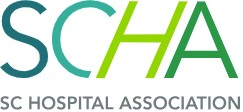 The public spiritedness of our underwriters allows us to bring Statehouse Report to you at no cost. This week’s spotlighted underwriter is the South Carolina Hospital Association, the Palmetto State’s foremost advocate on healthcare issues affecting South Carolinians. The mission of SCHA is to support its members in addressing the healthcare needs of South Carolina through advocacy, education, networking and regulatory assistance.
The public spiritedness of our underwriters allows us to bring Statehouse Report to you at no cost. This week’s spotlighted underwriter is the South Carolina Hospital Association, the Palmetto State’s foremost advocate on healthcare issues affecting South Carolinians. The mission of SCHA is to support its members in addressing the healthcare needs of South Carolina through advocacy, education, networking and regulatory assistance.
Founded in 1921, the South Carolina Hospital Association is the leadership organization and principal advocate for the state’s hospitals and health care systems. Based in Columbia, SCHA works with its members to improve access, quality and cost-effectiveness of health care for all South Carolinians. The state’s hospitals and health care systems employ more than 70,000 persons statewide. SCHA’s credo: We are stronger together than apart.
- To learn more about SCHA and its mission, go to: http://www.scha.org.
Great cartoon
To the editor:
![]() Had to look up NFT and IRL in an urban dictionary. Thanks for keeping us old folks up-to-date on current lingo.
Had to look up NFT and IRL in an urban dictionary. Thanks for keeping us old folks up-to-date on current lingo.
Now we need a cartoon on changing emojis meanings. I recently heard that the skull emoji is replacing the smiley face. Reason: young people are tired of having their grandparents use the same emojis they are using. It’s exhausting trying to keep up with this stuff.
— Bernadette Houghton, Columbia, S.C.
On left lane slowpokes
to the editor:
Traffic congestion is a physics problem: Moving solid objects through an Interstate tube. Traffic congestion is a big problem in most major urban centers. Before 2020, the average U.S. motorist spent 54 hours every year in traffic delays.
Consider the next time the blue lights or an emergency vehicle travels sirens blaring approaches. The vehicles pull right. Focus on what happens after. The entire column of right lane vehicles slows to a crawl because right lane density increased. Likewise, a blue light officer giving a ticket on the right of the road. (Maybe someone going too slow). We are expected to get in the left lane. Creating the same density condition slowing instead the denser congested left lane.
The slowpokes in the left lane legislation will actually increase the right lane density and then slow everyone down in the right lane. As the right lane density increases, the flow of the vehicles will spread to the left lane slowing Senator Harvey Peeler as he cusses at the traffic on his way home.
The tell that the (proposed) legislation is fatally flawed is in the provision, “Subsection (A) of this section does not apply: when no other vehicle is directly behind the vehicle in the left lane.” This is the operational definition of congestion that must universally occur on our highways given the vehicle volumes.
Legislators. please get some decent modeling from the S.C. Department of Transportation and Clemson Engineering on the bill before you muck up further our S.C. Interstate highways as the legislation is unrooted in what we know about congestion physics.
— Fred Palm, Edisto Island, S.C.
Send us your thoughts
We love hearing from our readers and encourage you to share your opinions. But to be published, you’ve got to provide us with contact information so we can verify your letters. Letters to the editor are published weekly. We reserve the right to edit for length and clarity. Comments are limited to 250 words or less. Please include your name and contact information.
-
- Send your letters or comments to: feedback@statehousereport.com
Epic fail
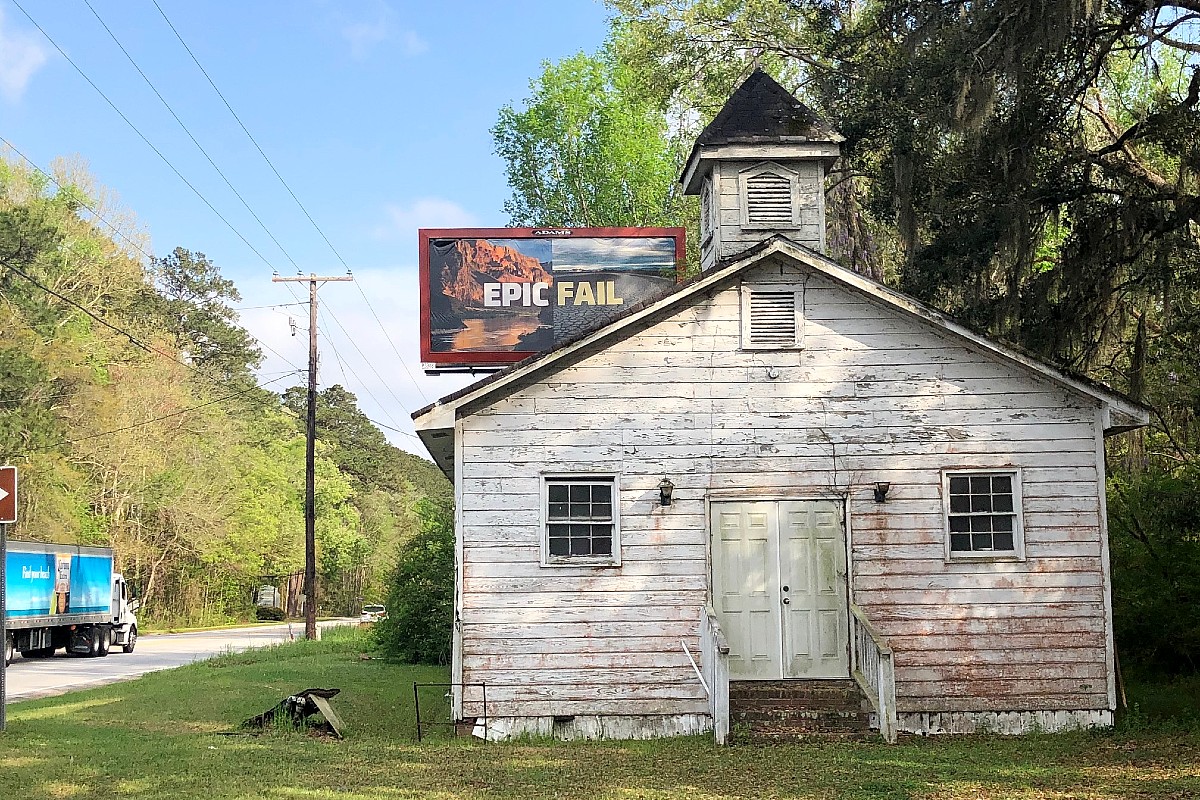
This will be tough: Here’s an old church somewhere in the Lowcountry. Where? Send your guess to feedback@statehousereport.com — and remember to include your name, home city and contact information.
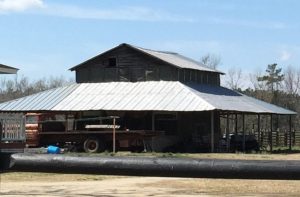 Last week’s mystery, “Farm building” showed an old tobacco barn, the Dillard Barn, outside of Mullins, S.C.
Last week’s mystery, “Farm building” showed an old tobacco barn, the Dillard Barn, outside of Mullins, S.C.
Congratulations to those who identified it: George Graf of Palmyra, Va.; Charles Davis of Aiken; Jay Altman and Elizabeth Jones, both of Columbia, Jacie Godfrey of Florence; David Lupo of Mount Pleasant; Allan Peel of San Antonio, Texas; Frank Bouknight of Summerville; Henry Eldridge of Tega Cay; and Don Clark of Hartsville.
Altman, who grew up in Mullins, says the barn was “built circa 1894-1895 by John H. Dillard and his sons A.E. and Daniel Dillard, and was used for curing tobacco until 1981, when bulk tobacco barns replaced it.”
Clark, who said the barn was a national landmark, added, “I spent a number of hot summers hanging sticks of tobacco in tobacco barns just like this one. The green harvested leaves would be brought from the field, and women working under the open lean-to attached to the barn would string the tobacco on wooden sticks. Then, the hangers would climb up in the barn and starting from the top, would hang the sticks across runners across the width of the barn and work their way down until the barn was full. A furnace was then fired up, and the crop was cured. Afterwards, you could take out the sticks two at a time as the cured tobacco was lighter.”
- Send us a mystery. If you have a photo that you believe will stump readers, send it along (but make sure to tell us what it is because it may stump us too!) Send to: feedback@statehousereport.com and mark it as a photo submission. Thanks.
ORDER NOW: Copies are in Lowcountry-area bookstores now, but if you can’t swing by, you can order a copy online today.
ABOUT STATEHOUSE REPORT
Statehouse Report, founded in 2001 as a weekly legislative forecast that informs readers about what is going to happen in South Carolina politics and policy, is provided to you at no charge every Friday.
Meet our team
- Editor and publisher: Andy Brack, 843.670.3996
- Special correspondent: Lindsay Street
Donate today
We’re proud to offer Statehouse Report for free. For more than a dozen years, we’ve been the go-to place for insightful independent policy and political news and views in the Palmetto State. And we love it as much as you do.
But now, we can use your help. If you’ve been thinking of contributing to Statehouse Report over the years, now would be a great time to contribute as we deal with the crisis. In advance, thank you.
 Buy the book
Buy the book
Now you can get a copy of editor and publisher Andy Brack’s We Can Do Better, South Carolina! ($14.99) as a paperback or as a Kindle book ($7.99). . The book of essays offers incisive commentaries by editor and publisher Andy Brack on the American South, the common good, vexing problems for the Palmetto State and interesting South Carolina leaders.
More
- Mailing address: Send inquiries by mail to: P.O. Box 21942, Charleston, SC 29413
- Subscriptions are free: Click to subscribe.
- We hope you’ll keep receiving the great news and information from Statehouse Report, but if you need to unsubscribe, go to the bottom of the weekly email issue and follow the instructions.
- Read our sister publications: Charleston City Paper (every Wednesday) | Charleston Currents (every Monday).
- © 2021, Statehouse Report, a publication of City Paper Publishing, LLC. All rights reserved.
















